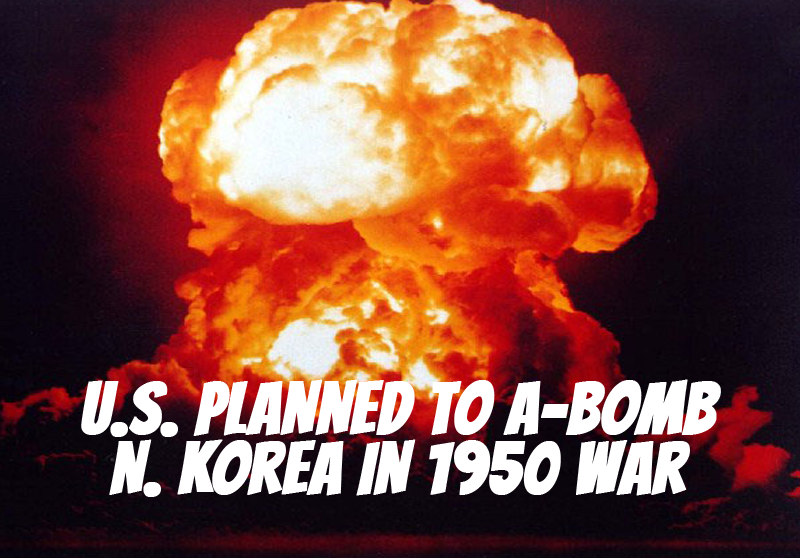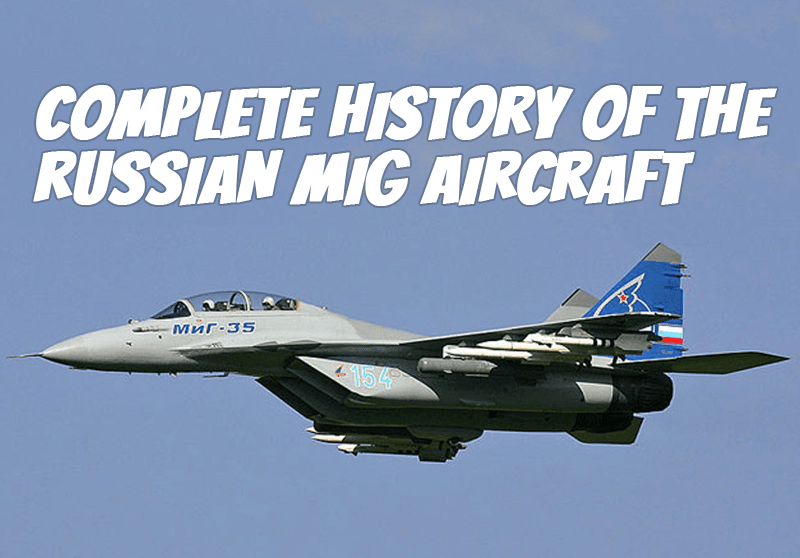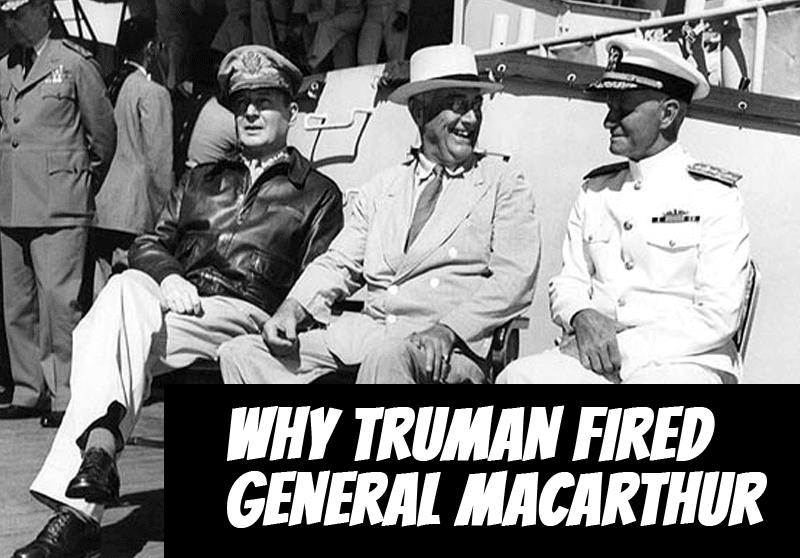Nuclear Weapons And Aircraft Waited For Orders
Introduction:
In the past I was invited to speak and give a slide show covering the Korean War of 1950 to large groups of professional engineers. During one of my talks I briefly mentioned that the U.S. came dangerously close to dropping multiple A-Bombs on N. Korea during the 1950 war. After each one of my talks I always allowed questions. Several in the audience expressed surprise that the A-Bomb was even considered and most had never heard of our plan. No one knew how close we actually came to using it. I was surprised that it was basically unknown to most of our population. Not only was this war “the forgotten war” but one that most didn’t know about, or maybe just didn’t care about.
Controversy Between Truman and Macarthur
To set the stage for this story we will start with our finest General, Douglas MacArthur, who eventually took most of the blame. I find it ironical that the ideas that got him fired were also considered by President Truman and virtually all of our military brass. In this story I will attempt to stick with events and plans covering the proposed usage of the A-Bomb.
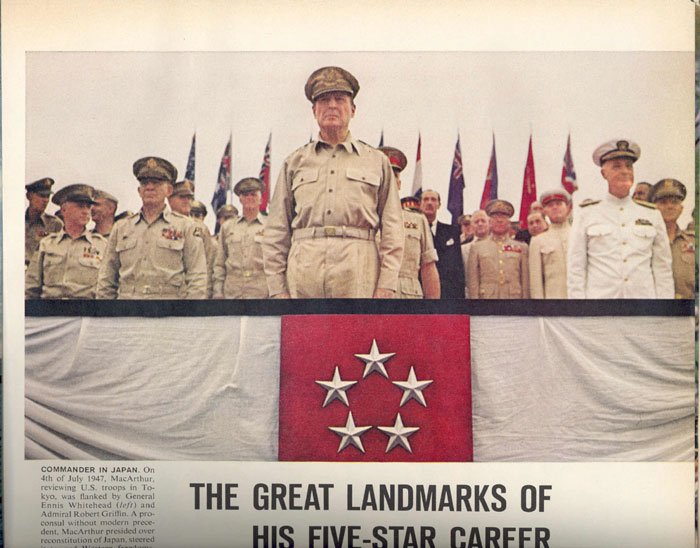
Macarthur Takes Over
MacArthur was designated Commander in Chief Far East Command in 1947. Upon the North Korean invasion of South Korea he was designated Commander, UN Command in the Far East, July, 1950. He had arrived in Japan in 1945 and operated out of the top floor of the Dai Ichi building where he ruled the reconstruction of bombed out Japan, an almost impossible job.
Japanese crowds lined the streets to get a glimpse of him as he arrived at his office. Showing great humility, they were in awe of him since he arrived in 1945 as Viceroy. The Japanese press loved him, and life was good. He liked the preferential treatment and God like respect he received. It was inconceivable that another war was about to start in Korea, of all places. There had been skirmishes along the 38th parallel. MacArthur miscalculated the capability of another countries military. The Korean peninsular was divided, with a Russian-Allied communist government in the North, and a pro-Western government in the South. On June 24, 1950, the South was viciously attacked as North Korean armies swarmed across the dividing line. General MacArthur, in charge of the Allied occupation of Japan, assumed command of the United Nations troops.
U.S. Enters War with North Korea
The U.S. became embroiled in a war we did not want, and a war for which we were not prepared. General MacArthur was our most famous General, the biggest hero of WWII, West Point graduate, holder of The Medal of Honor. He immediately took complete control of every aspect of the war, including tactical planning. The U.S. had insufficient military to quickly repel the fast advancing N. Korean army. MacArthur was successful in stopping the complete overthrow of South Korea, with American troops proceeding North toward the Yalu River, which separated N. Korea from China, and Russia.
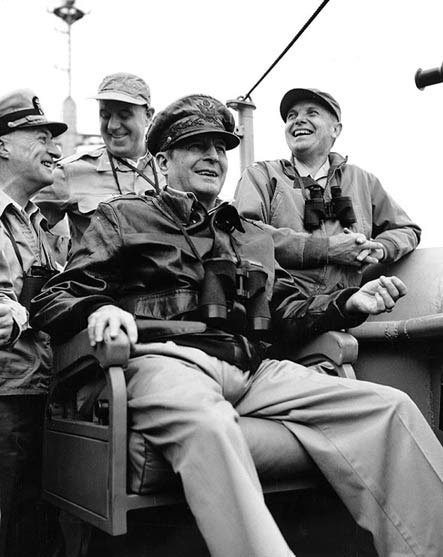
March to the Yalu
MacArthur began talking of “marching to the Yalu”. He did not know he was in a war he would not be allowed to win. The first dark clouds were beginning to appear on the horizon. Truman reminded him that operations North of the 38th had to be authorized by the U.S. MacArthur’s military plan was to proceed with all deliberate speed in advancing to the Yalu. Again, he was warned not to provoke the Chinese, as it could not only draw China but Russia into a third World War. There were repeated warnings that the Chinese were already preparing to cross the Yalu and attack the U.S. forces. Truman scheduled a showdown meeting with MacArthur on Wake Island. MacArthur was extremely displeased over the proposed meeting, which went on exactly as predicted. Truman expressed his growing concern over Chinese intervention. It was here that MacArthur made his biggest mistake. He announced that the war “would be terminated by Thanksgiving-they are thoroughly whipped, North Korea has no possibility of success”. What an arrogant and unfortunate statement. “There would be the greatest slaughter if China tried to put ground troops across the Yalu. They would be destroyed”. Little did he know that even as he spoke tens of thousands of Chinese were swarming across the Yalu. MacArthur would soon have to eat his eloquent words.
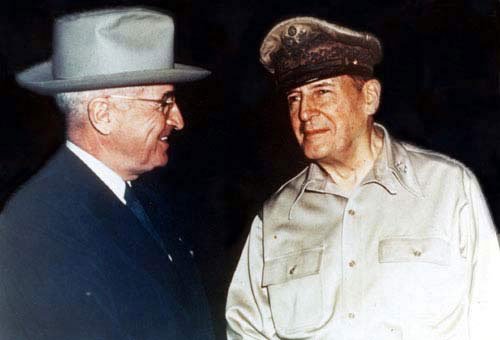
Chinese Enter the War
MacArthur believed the North Korean Military had fled into Manchuria. How wrong he was. Four infantry armies, three artillery divisions and an anti-aircraft regiment, 260,000 men, crossed the Yalu into North Korea. MacArthur downplayed the escalation, proposing to attack the new Chinese armies. He was again urging greater escalation. Tensions and tempers were rising over the proposed handling of the Chinese intervention, and his continued controversies with virtually all of the U.S. military leaders.
The War Deteriates
MacArthur wanted to give an ultimatum to China which would have provoked Russia. He wanted to bomb Manchuria. His aggressive plans were upsetting both the British and U.S. Governments who feared WWIII if MacArthur was allowed to proceed. His misjudgments had a potential for catastrophe. His plan was called “insane”. After announcing “tell the troops when we get to the Yalu they can all go home. You will be home by Christmas”. Such announcements as this caused many enemies. Matthew Ridgeway objected vigorously to every one of his plans. The situation in Korea was now becoming precarious. Chinese troops were surrounding and overpowering many of our marine units, especially around the Chosen Reservoir. Weather at 20 below zero was taking it’s toll. Soon the Eighth Army was in full retreat with a real catastrophe in the making. MacArthur’s requests were rejected as being unwise.
Macarthur Now Considers Using the “Bomb”
With the oncoming defeat a distinct possibility, talk of using the Atomic Bomb was making the rounds. General Hoyt Vandenberg, speaking for the Air Force, suggested they were prepared to use it. MacArthur suggested a plan to use numerous bombs. The U.S. had a stockpile of nearly 300 air-burst bombs. Only President Truman could order them used. MacArthur was insisting he be given the sole right to use 50 bombs as he saw fit. He insisted on bombing the Yalu power plants with multiple strikes by B-29s. Suggestions came from all services and every General offered his own plan. Truman announced the U.S. was considering using the Atomic weapon against North Korea. The situation brought up a question in my mind: Our entire military complex was announcing their plans to drop the bomb, but MacArthur, with the same idea, was criticized for planning the same thing. A state of affairs was rapidly going from bad to disastrous.
In the war room Vandenberg dismissed the idea of further reprimands to MacArthur. “What good would it do? He won’t obey the orders”. General Ridgway exploded. “You can relieve any commander who won’t obey orders, can’t you?” Thus the idea of relieving MacArthur was on the table. He again requested that the Pentagon grant him a field commander’s discretion to employ nuclear weapons as necessary. He wanted them stockpiled in Okinawa, which they were finally stored ready for use after MacArthur’s request was denied. His plan was to drop between 30 and 50 atomic bombs-strung across the neck of Manchuria, and spread behind us, from the Sea of Japan to the Yellow Sea- a belt of radioactive cobalt for at least 60 years there would be no invasion of Korea from the North. The Russians, he claimed, would be intimidated by this and do nothing. He continued to strongly seek authority to deploy the bomb.
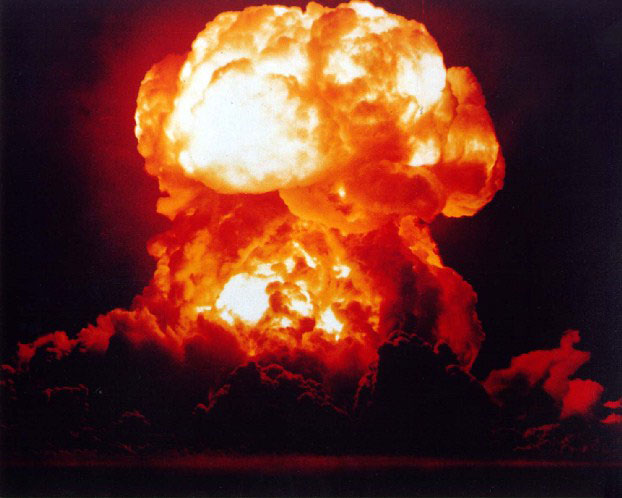
Truman Fires Insubordinate Macarthur
With all American forces in full retreat, some of the decisions made by MacArthur were accused of accelerating the crisis. American losses, particularly marines, reached the unacceptable range. The U.S. retreat was humiliating. The conversations now turned to total evacuation of our forces. General Ridgway assumed more and more responsibility in decision making. MacArthur rejected any type of negotiated settlement. He had derailed the U.S. initiative which was actually a dare for China to continue the war. He had always wanted a war with China. The Pentagon received his message, which infuriated many high ranking officials.
Truman had considered firing MacArthur many times previous to this, but this was the last straw. Actually the order of Dec. 6 which MacArthur had disobeyed was explicit enough to warrant court-martial proceedings. MacArthur’s statements were causing consternation in Washington as was his insulting personal letter to Ridgway. His advice letter to the House of Representatives again infuriated everyone. MacArthur wanted a war with China, and his leadership could no longer be tolerated. A meeting was held with Truman to determine how to get rid of MacArthur. Truman insisted “I’m going to fire the son of a bitch right now”. MacArthur was ordered to turnover his command to Lt. General Ridgway. General Bradley warned Truman that if MacArthur heard about the orders before they reached him officially he might resign with an arrogant flair. Truman exclaimed “The son of a bitch isn’t going to resign on me, I want him fired”. MacArthur’s dismissal was announced on late night radio: ” I have decided that I must make a change in command in the Far East. I have, therefore, relieved General MacArthur of his command and have designated Lt. Gen. Matthew Ridgway as his replacement”.
U.S. Threatens Atomic Warfare
On Nov. 5 1950, the Joint Chiefs of Staff issued orders for the retaliatory atomic bombing of Manchurian military bases, if either their armies crossed into Korea or if PRC or KPA bombers attacked Korea from there. The President ordered the transfer of nine Mark-4 nuclear capsules “to the Air Force’s Ninth Bomb Group, the designated carrier of the weapons, and signed an order to use them against Chinese and Korean targets.
On Nov. 30, 1950, the USAF Strategic Air Command was ordered to “augment it’s capacities, and this should include atomic capabilities.
President Truman remarked that his government was actively considering using the atomic bomb to end the war in Korea but that only he commanded atomic bomb use.
In 1951 the U.S. escalated closest to atomic warfare in Korea. Because the PRC had deployed new armies to the Korean frontier, pit crews at the Kadena Air Force Base, Okinawa, assembled atomic bombs for Korean warfare, lacking only the essential nuclear cores. In Oct. 1951, the U.S. effected Operation Hudson Harbor to establish nuclear weapons capability. USAF B-29 bombers practiced individual bombing runs (using dummy nuclear or conventional bombs) from Okinawa to North Korea, coordinated from Yokota AFB in Japan. Hudson Harbor tested “actual functioning of all activities which would be involved in an atomic strike, including weapons assembly and testing, leading to ground control of bomb aiming”. There were an increasing number of suggestions on precisely how the atomic bombing of N. Korea would be conducted. Robert Oppenheimer, director of “the Manhatten Project”, was designated a consultant in the tactical use of the A-bomb.
With atomic weapons already on Okinawa, the stage was set to proceed with the actual detonation of numerous nuclear bombs. It was suggested that General Curtis LeMay be put in charge of the actual drops. All ranking officials plus The President of the U.S. agreed to the plan. Everything was ready, just waiting for the “word”.
As we all know the “war” ended just about where it started. The stalemate was insulting to the U.S., as we had lost the war. The humiliation went deep, as the tragic loss of 36,913 of our best men will always be difficult to accept.
It is somewhat ironic that after 60 years we are still legally at war. Perhaps we should have proceeded with our plan in the 50s war, as we are again faced with the same problem. The situation now is not the same as 1950. N. Korea is one of the best prepared nation militarily for any kind of confrontation, on land or nuclear. They are equipped with top Russian fighters, and highly accurate surface to air missiles. Thought must be given to the fact that they have several atomic weapons which can be delivered short or long range from mobile launchers. It is not a mistake to predict they will very soon have ICBM which could reach any part of the U.S.
N. Korea has a Stockpile of Chemical Weapons
N. Korea has had for some time a substantial arsenal of chemical weapons. It reportedly acquired the technology necessary to produce large amounts of nerve agents with the means to launch them. N. Korea has expended considerable resources on equipping it’s army with chemical protection equipment. Their capability to launch missiles containing nerve agents is possibly more frightening than the a-bomb. In a relatively few short years they will have the capability to strike the U.S. with not only nerve agents but possibly the neutron bomb. The U.S. has allowed this to happen, and has nobody to blame but itself. We allowed this to happen, and will live to regret it.
Personal opinion of Wayland Mayo, website historian.
- The Battle of Midway: Turning the Tide in the Pacific - June 7, 2023
- The D-Day Operation of June 6, 1944 - June 6, 2023
- The B-29 that Changed History - June 4, 2023

